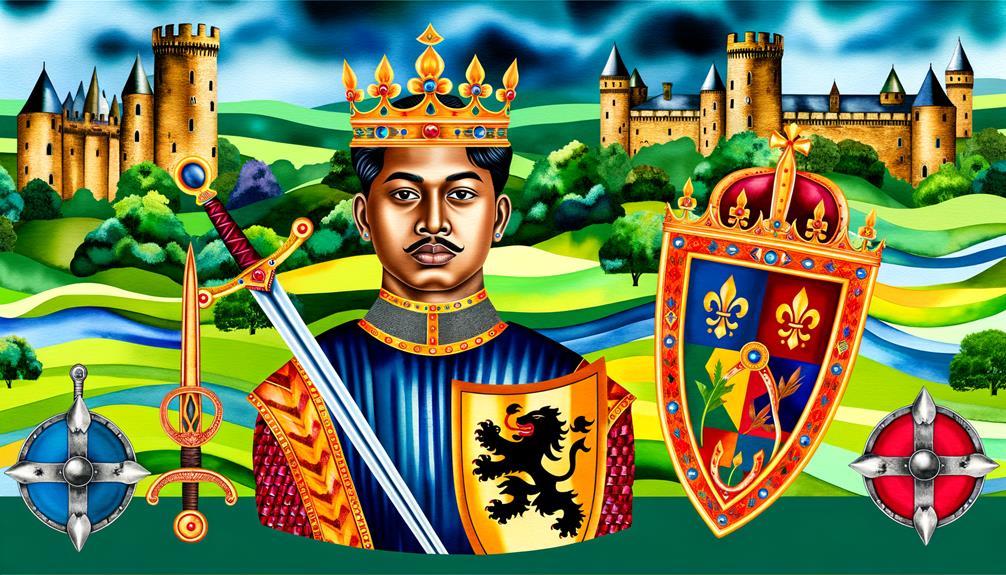Enrique Name Meaning in English
Enrique, a name of ancient Germanic origin, evolved from Heinrich and translates to 'ruler of the home' in English. Comprising 'heim' (home) and 'ric' (ruler), it underscores themes of authority and guardianship.
This name journeyed through linguistic transformations, becoming Henri in Old French before reaching the Iberian Peninsula. Enrique embodies cultural significance, symbolizing leadership and resilience, and is borne by many notable historical figures.
Its popularity is especially strong in Spanish-speaking regions, further boosted by media influence and cultural icons like Enrique Iglesias. To understand the deep historical and cultural implications of this distinguished name, continue on.

Key Takeaways
- Enrique translates to 'ruler of the home' in English.
- Originates from the ancient Germanic name Heinrich, combining 'heim' (home) and 'ric' (ruler).
- Reflects themes of authority, guardianship, and leadership.
- Symbolizes grandeur, reverence, and resilience in various cultures.
- Popularized by historical figures and media personalities like Enrique Iglesias.
Historical Origins
The historical origins of the name Enrique can be traced back to the Germanic name Heinrich, which later evolved through various linguistic changes across different European cultures. Initially, Heinrich combined the elements 'heim,' meaning home, and 'ric,' meaning ruler, reflecting the societal values of leadership and territorial governance.
The name shifted into the Old French 'Henri' during the Carolingian Empire, ultimately arriving in the Iberian Peninsula as 'Enrique.' This shift was influenced by the influx of Frankish culture into Spain, especially during the medieval period. Enrique subsequently became prominent in Spanish-speaking regions, symbolizing noble lineage and leadership.
The name's historical journey underscores a blend of cultural integration and linguistic adaptation, enriching its contemporary significance.
Linguistic Roots
Rooted in the ancient Germanic language, the name Enrique underwent significant phonetic and morphological metamorphoses as it traveled through various cultures and languages.
Originating from the Germanic name Heinrich, which itself comes from the elements 'heim,' meaning 'home' or 'estate,' and 'ric,' meaning 'ruler' or 'power,' the name evolved as it was adopted by different linguistic communities.
In Old French, Heinrich was adapted to Henri, subsequently influencing the Spanish adaptation to Enrique. Each linguistic transformation preserved the core meaning while adapting to phonetic norms of the adopting language.
This journey from Heinrich to Enrique highlights the dynamic nature of linguistic evolution, reflecting both the stability of meaning and the fluidity of linguistic expression.
Cultural Significance
As Enrique traversed diverse linguistic landscapes, its cultural significance became deeply embedded in the traditions and histories of the communities that embraced it.
This name, with its noble connotations, has been borne by historical figures, artists, and leaders, leaving an indelible mark on various cultures. The name Enrique evokes a sense of grandeur and reverence, embodying qualities such as leadership and resilience.
Consider these emotionally evocative aspects:
- Heritage: Enrique symbolizes a rich cultural legacy passed down through generations.
- Identity: For many, the name is a core part of their familial and personal identity.
- Inspiration: Influential Enriques have inspired countless individuals in diverse fields.
- Unity: The name fosters a sense of belonging and unity among those who share it.
Meaning in English
Enrique, derived from the Germanic name Heinrich, translates to 'ruler of the home' in English, encapsulating themes of authority and guardianship. This meaning reflects a deep-rooted association with leadership and domestic responsibility.
The name Heinrich itself is composed of the elements 'heim,' meaning home, and 'ric,' meaning ruler or powerful. These components signify a person who is not only a leader but also a protector of their household. The translation emphasizes a blend of strength and care, suggesting a figure who upholds stability and order within their domain.
This dual aspect of governance and protection makes Enrique a name imbued with both respect and affection, highlighting its enduring appeal across cultures and generations.
Popularity and Usage
Building on the historical importance and meaning of Enrique, its popularity and usage have been notably influenced by cultural, geographical, and generational factors. In various regions, the name has seen fluctuating degrees of favor, driven by prominent figures and societal trends.
Factors contributing to the name's popularity include:
- Cultural Icons: Figures like Enrique Iglesias have brought international recognition, making the name synonymous with talent and charisma.
- Geographical Trends: In Spanish-speaking countries, Enrique remains a steadfast choice, while its usage in non-Hispanic regions is less prevalent.
- Generational Shifts: Older generations may opt for traditional names, while younger parents might seek modern alternatives.
- Media Influence: Exposure through literature, film, and music notably impacts name preferences.
These elements collectively shape Enrique's enduring legacy.
Conclusion
Ironically, while the name Enrique boasts rich historical origins, intricate linguistic roots, and profound cultural significance, its English meaning is deceptively simple: 'Henry.'
This simplicity belies the complex tapestry of influences and traditions that have shaped the name over centuries. Despite its straightforward translation, the name Enrique continues to enjoy widespread popularity and usage, underscoring the enduring allure of names that carry both historical weight and contemporary relevance.






